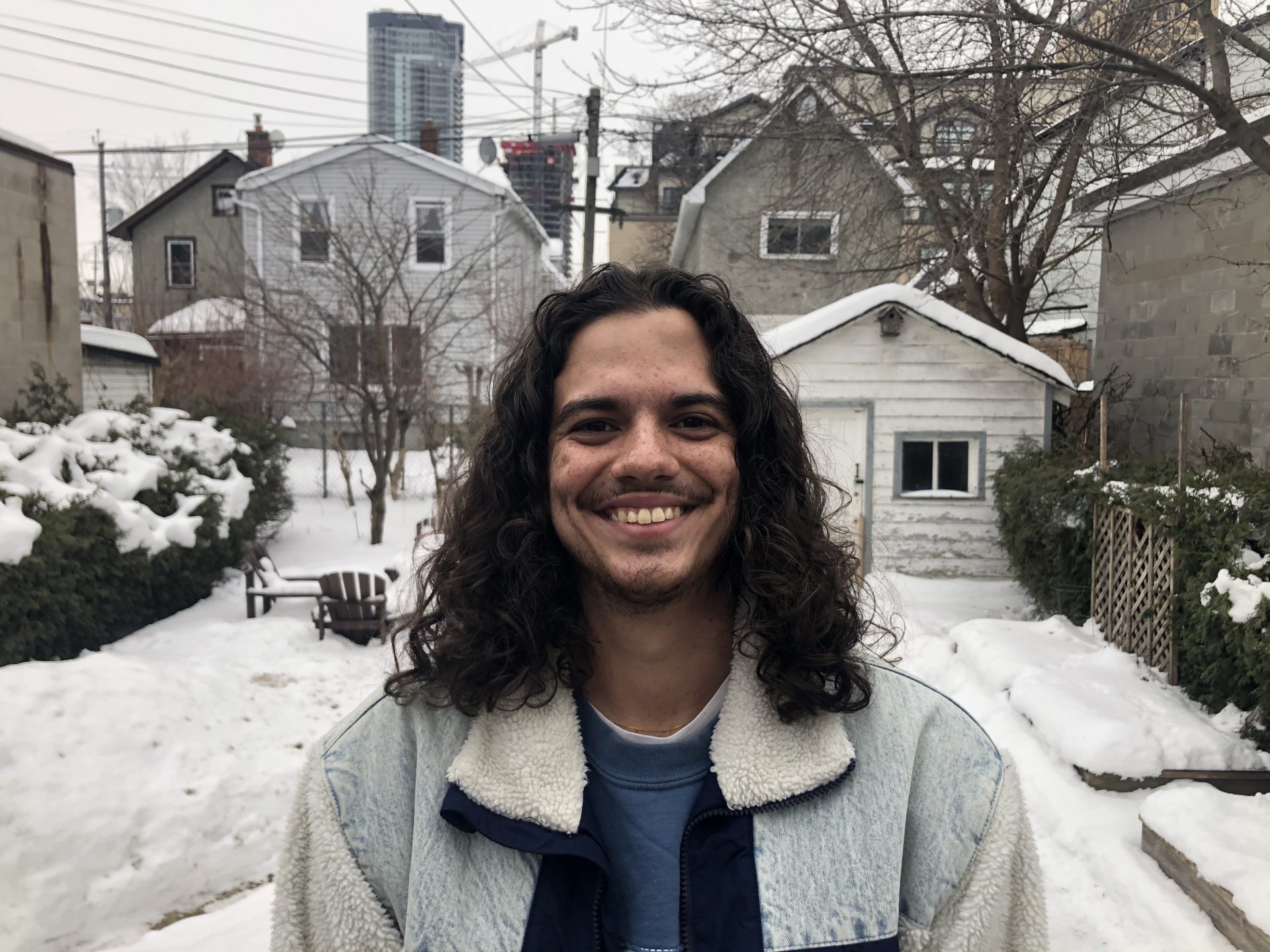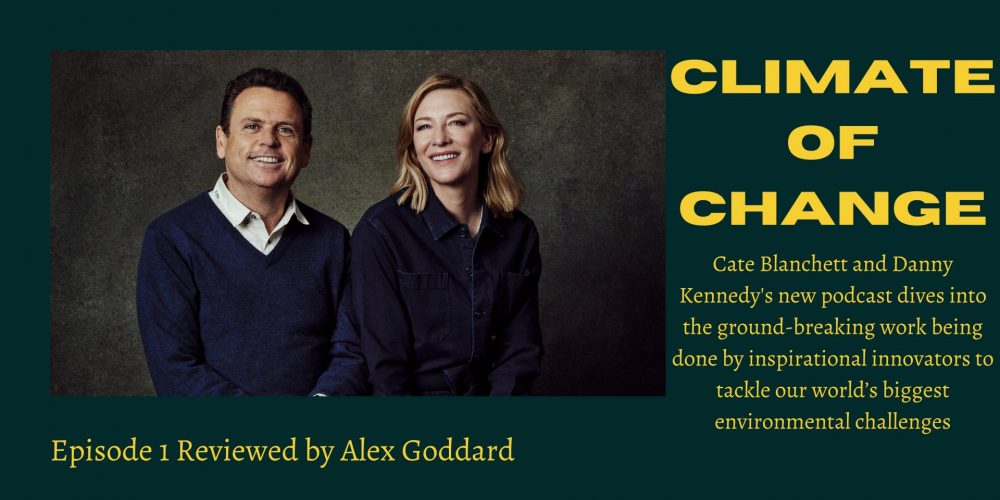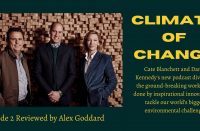Climate of change is a new podcast hosted by Australian actress Cate Blanchett, and Danny Kennedy, CEO of New Energy Nexus (NEX) the world’s leading ecosystem of funds and accelerators supporting diverse clean energy entrepreneurs, and environmental activists. This Audible Original podcast can be found on Audible.ca, and was sent to us early for review! As such, we thought it would be a great opportunity to create a weekly review series, covering the 6 episodes in total.
The first episode is titled ‘The Sooner the Better’. It starts with Blanchett describing her commute to London to record the podcast, in her electric car of course! She goes on to say this podcast is about “thing’s I’ve been thinking about”. She then moves on to talk about the range anxiety she is currently feeling on this commute as she forgot to charge her car, and not wanting to listen to the news as it feels like a constant barrage of bad news, both notions that almost all environmentalists can easily relate to, especially the anxiety-driven feelings of ‘what can we do’. As a quick aside, these feelings are known as eco-anxiety, and were covered in our Earth Day series! Blanchett then introduces Kennedy as the one she calls when feeling this climate, or eco-anxiety, saying that his optimism and solution-focused strategy for the future help with these feelings.
I appreciate the optimism that Kennedy brings, stating that this is an ‘anti-cynical’ podcast that is all about the positives – I can relate to much of the pessimism that Blanchett feels, so it is great to listen to a podcast focused on ‘hope in a hopeless world’. As Kennedy says, there are tens of thousands of entrepreneurs, scientists, and innovators, all working to solve this same problem of climate change – a thought I found very reassuring. As Blanchett, the optimist in training says though, it’s not all good. There are a myriad of people who are already suffering the effects of climate disasters and can seem a daunting, and at times impossible problem to solve. Kennedy’s optimism doesn’t blind him to the realities of climate change, stating that a crime has occurred, how we need to confront the injustice of climate change, and how setting realistic goals is the key to making these tasks seem more possible.
The first guest is introduced as climate action leader Mary Robinson – the former president of Ireland, and the first woman to hold that position, a UN envoy on climate change, and also a host of a climate change podcast of her own. Immediately, Robinson says a quote that stuck with me, quoting Desmond Tutu “I am not an optimist, I am a prisoner of hope.” As she says, if you have hope, you have the energy to make things happen. Within just a few seconds I already knew that I was going to love her time as the guest on the podcast. Robinson then brings up the earlier mentioned notion of eco-anxiety, which Blanchett realises she suffers from, saying that it often manifests itself as despondence, where an individual doesn’t know what to do, or does the opposite and acts as a motivator to create change. I will also be adopting her approach of asking environmentalists how they are doing, and how their self-care is, as eco-anxiety is something that I think impacts every single one of us in some form or fashion. I really enjoy the approach that Blanchett and Kennedy have, as it is apparent that Blanchett really cares about the environment, but isn’t quite as entrenched in some of the jargon, or language that most environmentalists have heard, so it is refreshing to hear a unique perspective, and curiosity as Kennedy explains some of these terms.
Robinson goes on to explain a three-step plan that I think most of us should follow. This includes making the climate crisis personal by making individual changes in your own life, such as eating less meat, getting angry with those who aren’t doing enough, such as the government, investors, and cities, and joining organisations to use your voice. The final way she suggests is to envision the world we want, and through that understand how fast we need to change, understanding that this is a crisis, and we should be in crisis mode. I love Kennedy’s take on this, saying she has given us a cheat sheet for eco-anxiety.
The relationship between Blanchett and Kennedy also makes this a great listen, they’ve known each other for years and it’s really easy to tell through the chemistry that they share. Even recounting marches that they went to years ago, and how Blanchett used her fame to bring more attention to those rallies. I was unaware of her climate activism, and really appreciate the work she has done throughout her life. Despite all of this, she still feels the same guilt that many do about not doing enough for climate change, even saying she feels guilty using the hairdryer, or when her family leaves the lights on. The relatability of statements like these really makes the podcast a great listen. This, coupled with Kennedy’s optimism, saying that what’s important is we know what to do and that we are doing it, even if it needs to be faster, makes the podcast a gripping, yet also inspiring listen. As he says, yes the climate is changing, but so is the world of energy, as we shift from fossil fuels to renewable energy more quickly every year. Optimism. What a breath of fresh air.
Kennedy’s optimism and hope for the future continue as Blanchett describes feeling trapped in society’s use of fossil fuels. Here, Kennedy states that he believes by 2040 we need to reach not net-zero, but true zero carbon emissions. He goes on to say that we are currently in the clean energy revolution and believes that the large drivers of carbon emissions, such as transport, are en route to being more sustainable. When Blanchett says she has been ignoring the news, Kennedy sounds surprised, going on to say that the constant ‘doom and gloom’ is part of our problem with our communications, and language surrounding climate change. As he says, believing in climate action and change, is the only way we can make it in the world.
The notion of humans being special due to not our intelligence, but our friendliness, and willingness to cooperate is very interesting, and one I had not heard discussed before. The words of the second guest, Rutger Bregman really resonate with me, especially when he goes on to say that humans are the stories we tell ourselves, and how our future story must be one of hope and the possibility of change. Messages like this make the podcast both inspiring, but also a powerful listen. Only through collaboration can solutions be properly integrated, an idea echoed by Kennedy, and one to think about as we move forward with our renewable energy initiatives.
Kennedy then highlights how his company works with innovators and entrepreneurs to revolutionise energy, with Jeraiza Molina, co-founder of SHIFTECH Marine who aims to give fisherfolk clean energy, as opposed to the conventional batteries they currently use. This is used to attract fish when night fishing and is powered by clean energy, through solar energy. Not only is this more sustainable, but also results in fisherfolk being able to spend less money on fuel. The guests really make this podcast shine with some of their quotes, here Molina says one of the best ways to combat climate change on an individual level is to look at the small problems in your community that contribute to climate change. This change can then be catalytic, and inspire those around the globe to follow suit. “To go Global, you have to go small”. I also must say, Blanchett provides such great insights and asks great questions to Kennedy. Here, she asks whether this initiative will contribute to overfishing and a question that popped into my head almost immediately. As Kennedy says, the real issue is with industrial, unregulated fishing, not the local fisherman. They may have a local impact, but not on the global scale that the fishing industry does. By saving money it also allows these fisherfolk to take more care and has resulted in a finer sorting of bycatch.
I love the way this podcast ends, echoing back to Mary Robinson, with Kennedy asking Blanchett how she is feeling. Here, I can relate to Blanchett where she says she often hyper focuses on the negative and is grateful for Kennedy’s optimism to balance it out. Overall, I found this podcast to be a refreshing, and energising listen, especially when compared to the often (understandably) despondent discourse around climate change. The contrast between Blanchett’s relatable pessimism, and Kennedy’s optimism and solution-based focus for the future make this a podcast worth listening to. I am greatly looking forward to reviewing the rest of it!














